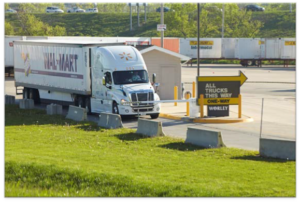During the past four years, the theft of food products has increased significantly, and food is now the favorite target of cargo thieves, surpassing thefts of electronics, pharmaceuticals, and tobacco products – the former “Big 3”. The reason of course, is that food products have become much more valuable. Drought and unusual weather in much of the key growing areas in the United States have increased the prices of crops and livestock, with resultant higher prices on finished products. According to Food Processing, there are any number of “independent food brokers” that will pay 70 to 80 cents on the wholesale dollar value of many packaged goods. In addition, often the security surrounding food products is not as rigid as that on other products. In its 2013
U.S. Cargo Theft Report, FreightWatch International indicated that food/drink thefts rose 34.42% over 2012, and driver theft increased by 44%. The average value of a stolen food shipment was $89,000. Industry experts predict that this trend is not likely to change in the foreseeable future.
In the past the majority of cargo thefts have occurred in unattended yards or parking areas, but carrier identity theft, organized by sophisticated fraud rings, is now the fastest growing method of shipment theft. The thieves simply steal the identity of an existing or fictitious carrier, prepare the necessary documents, and pick up the load. Everything appears legitimate. According to FreightWatch “deceptive pickups” accounted for 6.4% of 2013 cargo thefts. Since 2011 however, such thefts have increased by more than 60%.
A case in point was summarized in the September, 2013 issue of Food Logistics. A driver picked up a load of Russian king crab in Los Angeles destined for Seattle. It never arrived at its destination. When a frantic load broker began searching for it, he found that 25,000 pounds of crab, worth $400,000 had simply vanished. The driver’s documents, contact information, and even his trucking company were fraudulent.

If there is a weak spot in these deceptions, it most likely will be the driver. At times the driver will not be able to verify his employment with the carrier or may seem to be ignorant of basic facts about his company. This has made it critical that shippers get as much exposure to the drivers as possible.
At Worley, due diligence starts at the front gate where drivers are checked in, identification and paperwork verified, and loading doors assigned. At the building there is a designated entrance to an area where drivers handle necessary paperwork and receive instructions. While drivers are restricted to this area, they are made as comfortable as possible, with a telephone, vending machines, and restrooms available. In addition to providing convenience for the drivers, this eliminates the need for their leaving the restricted area and entering the facility.

If it is necessary for a driver to be on the dock to observe loading, verify quantities, or secure the loads, they are treated as a visitor, requiring a log in and the possession of a picture ID. For their own protection they are also required to wear a safety vest. When the driver leaves the facility with the load, paperwork and seals are checked carefully.
During each of the “exposure points”, driver demeanor is observed closely and any suspicious behavior is immediately reported by the person observing it.
While it seems that each day brings a new method of theft of information and product, Worley takes seriously the protection of clients’ products and constantly monitors its security policies and procedures, particularly as they relate to drivers.
Finally, in its 2013 report, FreightWatch identified several problem states. Iowa was not one of them.